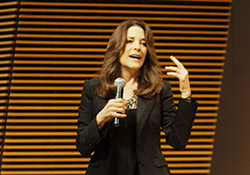Echoing a familiar TC perspective Marianne Williamson argues for an awakeness to suffering
“The spiritual journey does not ignore suffering,” the internationally known author and lecturer Marianne Williamson told a TC audience in early October. “It does include the realization that the ultimate goal is happiness – and that happiness is found by going through the suffering, not around it.”
Modern society ignores suffering and even capitalizes on it by sending citizens to prison and to war and by encouraging the “epidemic casual use of anti-depressants,” said Williamson, the author of six New York Times best-sellers (including A Return to Love and The Sacred Self Workshop) and the founder of a grassroots movement to establish a U.S. Department of Peace. In her view, depression is symptomatic of society’s ills, and should be addressed at its roots rather than medicated. “The understandable depression of the American people, the absolutely healthy upset of the American people should be more than a gold mine for drug manufacturers,” she said. “I hope everybody in this room at least gives that a serious thought.”
Speaking in TC’s Cowin Center at the invitation of the College’s Mind Body Spirituality Institute, Williamson said that those who object to the way society currently operates are being treated as crazy themselves. As a result, she said, therapeutic treatment today should take into account societal context the same way the treatment of an individual would consider the impact of having an alcoholic in the family.
At the center of society’s ills, in Williamson’s view, is society’s inability to countenance suffering and she noted that neither Jesus, the Buddha, nor the Israelites became enlightened without acknowledging it.
To illustrate, she told a story of a gorilla community discovered by anthropologists in which a group of gorillas were displaying signs of behavior that could be viewed as depression. The anthropologists decided to remove the depressed gorillas for six months and when they returned all the other members of the gorilla community were dead. The anthropologists concluded that the depressed chimps had served the early warning system of the village, Williams said, adding that she’d recently read that “one quarter of American women are at some point deemed clinically depressed. Yeah. Frickin A.” The crowd erupted in knowing laughter.
In Williamson’s telling, people are torn between a societally sanctioned way of viewing the world that focuses on external issues and a more natural focus inward that is based on love but which tends to be viewed as dreamy and unrealistic by society.
This separation allows for a more blinkered view of responsibility and connectedness to the world that a more spiritual approach would not, Williamson argued, describing abolitionist Quakers who in their deep study of the essence of humanity saw a light in every human being and could not help concluding that the ownership of another human being was wrong.
“In order for us to be psychologically healthy and spiritually healthy, we must be above all awake,” she said, echoing an idea that was often and eloquently sounded by TC’s late philosopher Maxine Greene. “And when we are awake, we realize who we are,” she said. “We realize that we are beings of light which means being of understanding which means being of the divine true self.”
To help people move beyond this societally imposed fixation on exteriors, Williamson said, “psychotherapy and religion and spirituality should be that which so prepares us, so grounds us in the truth of our being that it becomes inevitable that we move out into the world as we are inwardly guided to do and we kick ass like nobody else.”
The challenge is serious, she argued.
“We need to realize this is not the first time America has been in trouble.
This is not the first time that America or the American economy has so swerved
from its ethical center. This is not the first time that our democracy has been
threatened. This is not the first time there have been problems. Let it not be
the first time that a generation of Americans wimped out on the job of what it
would take to put things back on course.”
– Jonathan Sapers
Published Friday, Nov. 7, 2014
